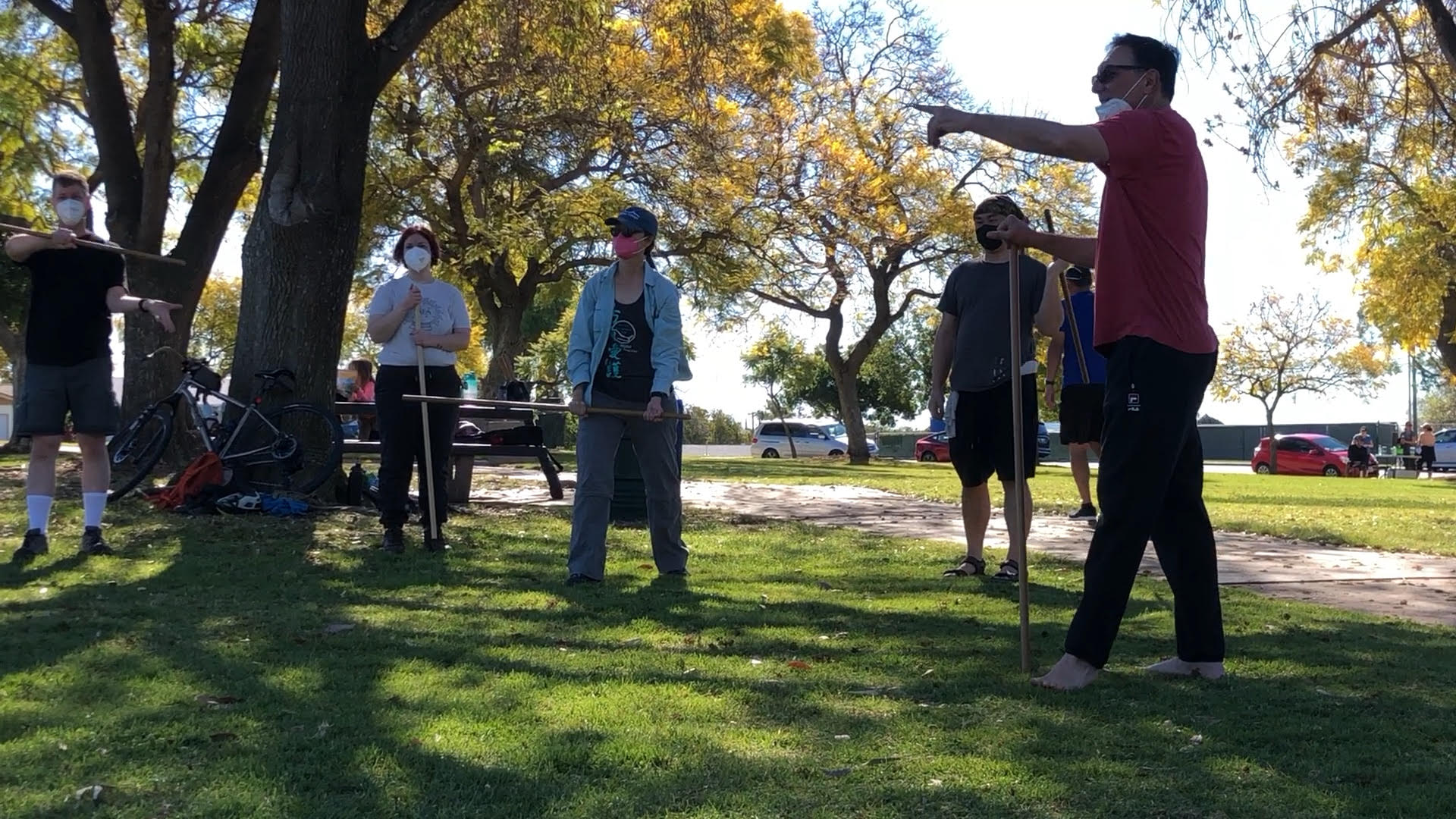As we emerge from our long pandemic hibernation, stretching and blinking at the sunlight, many folks are taking up Aikido. New participants are trying classes, jumping in, and sticking with it. Aikido dojos that had taken refuge on Zoom and in local parks are now back on the mat, and new students are joining us all the time.
At the dojo where I train we’ve been having visitors in unprecedented numbers — so many new students that we’re having rank tests almost every month. It’s heartening to see all these wonderful new faces, and so much enthusiastic participation.
We Are a Generation That Won’t Forget
We’ve all known people who were affected by The Great Depression. Frugal grandparents who saved every penny. Folks who couldn’t part with things that might be useful one day. They knew the hard times could come again. They never got over how tough it was during those years.
Similarly, the lessons of the pandemic will not be forgotten by those who’ve lived through this period in our history. Regardless of age, this shared experience has changed us.
We Have a New Sense of Urgency
We’ve developed a visceral understanding that we only get one precious, fragile life. Even if we are young and healthy, we see that we could be just one illness away from blinking out of existence.
“You know all those things you’ve always wanted to do?
EJ Lamprey, Author
You should go do them.”
So for those folks who have always wanted to try something exciting and challenging “someday,” who have meant to take up a personally meaningful practice “when they aren’t so busy,” or who just wish they could regularly do something really fun with friends, many are deciding that now is the time.
We Are Rediscovering Belonging
The pandemic has snapped us out of our shared illusion that our jobs define who we are, and that our employers should take the highest priority in our lives. We know now that our work should never be put ahead of our families, or our physical and mental health.
Now, with fresh eyes, we are searching for who we are, and where we might belong. This might be volunteering at a school, participating in a hiking Meetup group, or joining a dojo. I believe we are seeing the beginning of a reversal of a long decline in social participation, as described in Robert D. Putnam’s 2001 book Bowling Alone: The Collapse and Revival of American Community.
We are yearning for connection, and Aikido is a perfect place to rediscover that.
We’ve Seen the Value in Supporting Each Other
We’ve learned that through generosity and kindness we can make the world a better place. We’ve actively supported each other through some hard and trying times, from tipping generously to encouraging friends who are struggling. We’ve dipped our toes into being open and vulnerable, admitted our struggles, and asked for help — and our world didn’t end.
Not only does Aikido have a supportive community of fellow practitioners in the dojo and around the world, but the way of training itself is fundamentally collaborative. We help each other learn and execute each technique not by resisting our partner’s efforts, but by aiding them, guiding their movements by performing our own.
We’ve Seen the Cost of Zero-Sum Thinking
We’ve seen firsthand how things work out (or don’t) when people come from a culture of fear and scarcity. The common mindset of “for me to win, you have to lose” is increasingly being seen as unworkable.
Aikido isn’t about defending our position, protecting, attacking, blocking, dominating, winning, or destroying the other. We don’t train to be the strongest, toughest, or meanest. For the majority of Aikido there’s no competition, no trophies, no championships. We are all on the same team. There is no “other.”
We Know We Need to Move
We’ve learned that taking care of our bodies is crucial to living our best lives.
The pandemic years have shown us that in just a short period of inattention and sedentary living we lose conditioning. We easily become stiff and sore, and prone to injury. We lose strength, mobility, and endurance. We lose healthy muscle mass. We don’t have the energy we once did.
We can regain these things, but it’s not going to “just happen.” We need to seek out opportunities to move.
Fortunately, Aikido training is accessible to new participants of all ages and body types, and can be as challenging as we want, as we advance. We can each start where we are, and go as far as we like.
Aikido is easy on the body. We don’t train to harm or damage our partners. We train to take care of each other. This is a core philosophy of Aikido. We also train to take care of ourselves. We learn how to fall and roll safely, on mats. We naturally develop strength and agility through our training.
We Realize Our Need to Be Together With Others
We are social beings, and living in physical isolation isn’t good for us.
I truly appreciate Zoom. It has been the glue holding us together for the past two years. Our dojo kept training, my family stayed in touch, I participated in many writing and Aikido seminars and workshops. I’m grateful it’s available to us. But we need more than disembodied video meetings. After so much deprivation we know in our bones that we need to move together with other people.
Things Have Been So Heavy…
The past two years have been hard. A frightening, gut-wrenching struggle. Fighting for justice. Fighting for our country. Fighting for our lives. Important stuff.
We need to keep up those efforts. It’s not over. At the same time, we need a break. We need to recharge. We need to lighten up and have fun. Enlightenment, right? We need to roll around, laugh together, and cheer each other on.
Aikido is play. You wouldn’t think practicing a martial art would be a joyous activity, but it is. We take training seriously — we sincerely focus, and want to do our best — but it’s a heck of a lot of fun, too!
On the mat we find a freedom of movement similar to what you’d experience in water. After years, and often decades, of only standing and walking vertically, sitting in chairs, and lying in beds — a pretty limited set of options — we discover we’re able to move in ways we haven’t since we were little kids. Maybe not even then.
And it feels great to challenge ourselves to try difficult things and succeed. This is amazingly empowering.
“You can’t wait until life isn’t hard anymore before you decide to be happy”
Nightbirde, a contestant on America’s Got Talent, who recently died of cancer at 31
Want to Give It a Try?
Are you ready to get moving, challenge yourself, and lighten up, too?
New students bring light and life to a dojo. Everyone who practices Aikido would be delighted to see you walk through the door. We know what training has to offer, and are always happy to share it.
Don’t worry if you’re not in good shape. (You’ll get there.) Don’t worry about looking like you don’t know what you’re doing. (You’re not expected to.) Don’t worry that you’re too old, too young, too whatever. (You’re fine.) Don’t worry.
Come play. Join us.
About the Author — Linda Eskin
Linda Eskin began practicing Aikido in 2009, at age 46. From the beginning she was inspired to explore how Aikido is taught and learned. In addition to mentoring adults, and now teaching a weekly Focus on Fundamentals class for students of all ranks, she assisted in the children’s programs for over eight years.
Linda loves Aikido both from the technical perspective, and as a practice of awareness and embodiment. She is completing her forthcoming book, Aikido to Zanshin – 26 Essays on the Martial Art of Peace.
Linda’s passion is encouraging people to begin, and supporting new learners of all ages.
Linda trains with Dave Goldberg Sensei at Aikido of San Diego, in California, and holds the third black belt rank, sandan.





